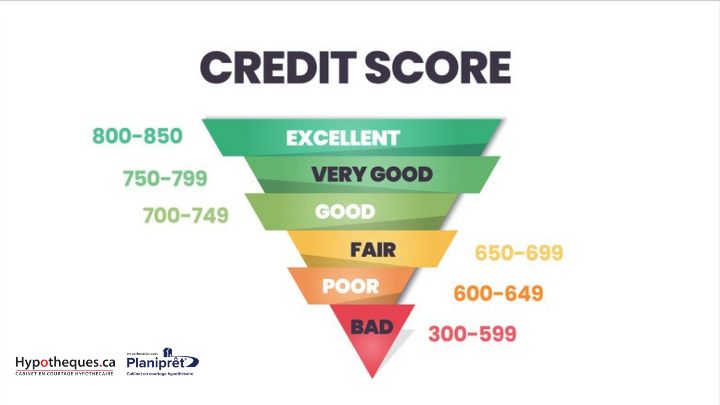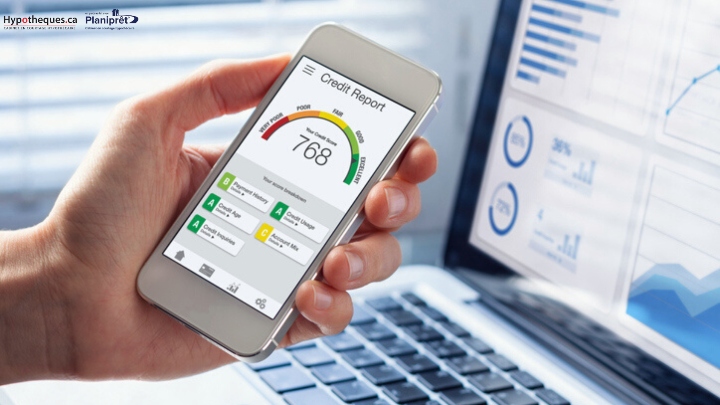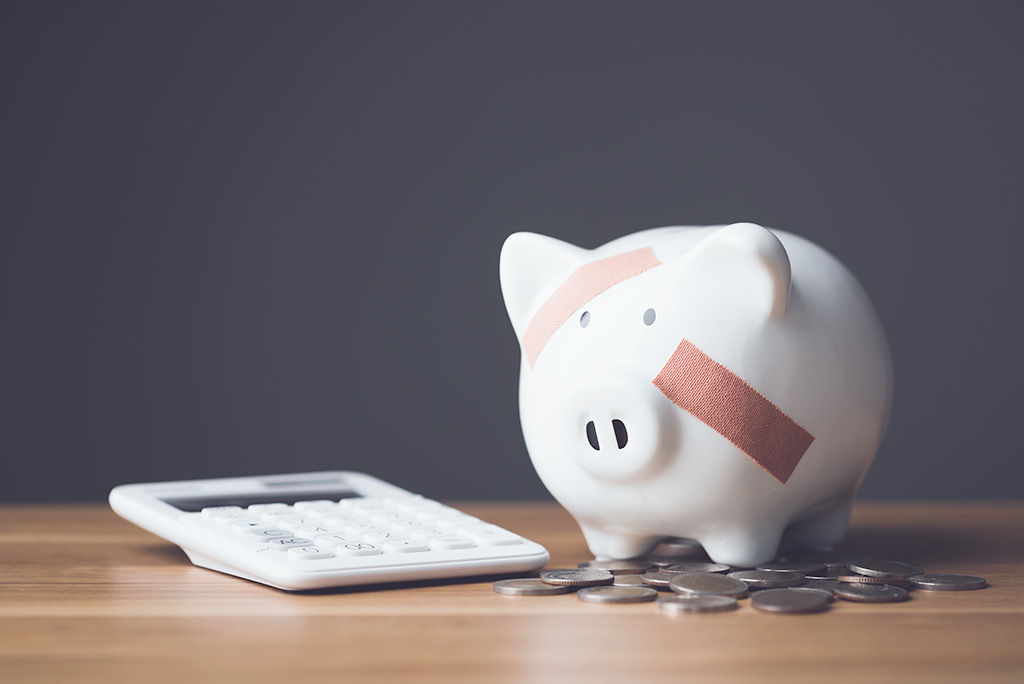In Canada, a good credit rating is a prerequisite for applying for credit. But how do you achieve this? Our brokers give you their tips!
What is the credit score?
The credit score, a critical component of your loan application, is a 3-digit score assigned to you by a credit reporting agency, such as Equifax or Transunion. This credit score is used to assess the likelihood that you will pay your bills on time and keep your commitments.
Having a good credit score is essential to help build the confidence of banks and financial institutions and your financial security.
The credit score determines the level of risk for the bank to accept or refuse a financing. Above a credit score of 680, it is generally possible to obtain the best loan conditions. However, it is possible to obtain financing with a lower score.
Banks apply internal criteria when deciding whether to grant or deny a credit application. If accepted, this means that the bank believes the applicant will be able to repay the loan. The credit score, also known as the credit rating, determines your ability and reliability to repay your debts.
What is a credit score?
The credit rating is a score set by the specialized agencies Equifax and TransUnion Canada that shows your credibility to repay your debts. The higher the number, the more reliable the borrower is. The worst score is 300, while the perfect score is 850.
From 680, you can consider that you have a good credit rating. So, if your credit score is above 680, then banks are likely to offer you particularly attractive interest rates because the probability that you will repay your monthly payments correctly is high. To avoid having difficulties with a mortgage or being offered a very high interest rate, it is best to have a credit score of at least 680. But of course, this also depends on other factors such as the amount borrowed, the down payment, the purpose of the loan, etc. If you have bad credit, getting a mortgage becomes more difficult.

How is the credit score calculated?
Your credit score is built by quantifying your reliability with respect to your financial obligations. This includes repayment of previous credits, but also bill payments, history, etc.
Here’s how the credit score is calculated:
- 35% due to payment history:
This is the most critical component of credit score- regularity of bill payments. If you always pay your bills on time, you’re off to a good start with your credit rating.
- 30% for current debt :
If you have already taken out many loans, your credit score will decrease considering that your borrowing capacity is mechanically reduced.
- 15% for credit history:
This factor measures how long you have been making loans. If you have used a line of credit or have a credit card, and have proven your reliability, then this is positive for your credit rating. That’s why you shouldn’t take the previous point as an invitation not to use loans. On the contrary, you should do so in moderation in order to improve your credit history.
- 15% for recent loans:
Each time you apply for a loan, the consultation of your credit rating automatically results in the loss of a few points, which are only regained a few months later. That’s why you should avoid multiple applications that lower your score by suggesting recurring financial difficulties. This is another reason to use a mortgage broker, since your credit score will only be requested once and then presented to the various creditors.
- 10% for credits used :
The credit rating also takes into account the type of credit instruments used (credit cards, lines of credit, personal loans, etc.)
What is a good credit score and what is a bad credit score?

14 Ways to Improve Your Credit Rating
There are different strategies on how to improve your credit rating:
- Make a budget
Before filing any credit application, make sure to:
- draw up your budget
- identify the reasons why you were over-indebted
You will then know the first steps to improve your credit rating.
- Pay all your credits before the deadline
One of the simplest strategies is to remember to pay off each credit card in full by the deadline. If you don’t, you won’t be able to improve your credit rating. Making payments on time will also help you avoid paying fees at an unreasonably high interest rate.
- Keep your credit card balance below 30%.
Always try to keep your credit card balance below 30% of the total amount. By keeping your credit card balance below 30%, you ensure a 100-point improvement in your credit rating. In addition, you limit the risk that creditors will think that you need financing to meet your needs and that you are in a precarious situation. Failure to do so will have a negative impact on your credit rating.
- Never exceed 50% of your credit card balance
Sometimes keeping your credit card balance below 30% of the total amount is difficult. To maintain a good credit rating, never go over 50% of your credit card balance limit. If you go over 50%, then you will have a bad score.
- Don’t close your unused accounts
Keep your credit and line of credit accounts open so you don’t get a bad credit score!
Having a long credit history is always good because it allows lenders to determine your financial stability by knowing your credit history. If your credit card history proves that you are a reliable borrower, it will have a positive impact on your credit score, creditors will trust you and offer you a better interest rate for your loan.
- Don’t just pay the minimum amount, pay your debts in full!
Avoid paying the minimum on your credit card. If you only make minimum payments, your credit rating will not improve. To improve your credit rating, it is important to pay your monthly balance in full and on time.
- Increase your credit limit
Your credit card limit is the maximum amount you can spend on your credit card. A practical solution to take no chances is to apply for a credit limit increase so that you do not spend more than 50% of your limit as explained above. But be careful not to spend more than you can afford otherwise you will have to pay interest on your credit at a rate usually around 20% and have a bad credit rating.
- Vary your loans (credit card, car loan…)
Vary the types of loans, such as credit cards, car loans, mortgages, etc. Of course, the risk of debt remains when you take out multiple loans. However, if you can manage and pay off several loans on time with different lenders, then you demonstrate to the banks your financial stability.
- Check your credit report annually to ensure there are no errors or fraud
Make it a habit to check your credit report regularly to ensure that no mistakes have been made. Ideally, you should check your credit report at least once a year. In order to obtain one, you must fill out an online form on Equifax or TransUnion Canada.
- Avoid applying for too many loans/credit cards
It is important to vary the types of loans. However, avoid applying for too many loans and credit cards. In fact, applying for several loans and then being turned down by different lenders is a major risk of over indebtedness and will have a negative impact on your score.
Avoid :
- apply for a line of credit just to see if it will be accepted
- accept a credit card to obtain discounts or gifts
- Start borrowing again!
Another way to improve your score after a bankruptcy or consumer proposal with the credit bureaus and regain the trust of these institutions despite your history is to start borrowing again. However, your loan applications must be made intelligently. We recommend that you start with loans that are easy to repay, such as :
- A credit card application with a security deposit
- A request for a loan repayable over a short period, i.e. less than 3 years.
- Avoid multiple funding requests close together
Another factor not to be underestimated in Canada is to avoid applying for too many loans at once. The more loans you apply for, the more lenders will think you are living beyond your means! In order to improve your credit rating, we advise you to focus only on the credit you really need.
- If you need to apply for a loan, do it at the same time
If you apply for a mortgage at several banks in the same week, it will be considered as a simple consultation of your file.
On the other hand, if you apply for loans from several lenders with an interval of several months, then several consultations will be recorded, which does not improve your rating.
- Demonstrate your financial stability
To demonstrate your financial stability, it is essential to show that you have:
- a stable home address
- a stable job
- A regular monthly income
- Pay all overdue accounts (Collection)
Another way to improve your score is to pay off every credit card and all your delinquent accounts. In fact, paying off your account in collections or your account in collections will increase your score. Keeping unpaid debts is the biggest factor that weakens your credit score. We recommend that you establish a payment plan for each delinquent account. Finally, once you are debt free, it will increase your monthly income because you will no longer have to pay interest. One of the factors not to be neglected.
Maintain a good credit rating to buy a home .
Which applications impact the credit score?
Applications that impact credit score:
- A request for a review of your credit file by the lender as part of the loan application process
- Multiple loan applications made at different times
- Recent credit applications
Requests that do not impact credit score:
- A request to obtain your file
- A request by a lender to verify your records as part of a loan application
- Multiple requests for the same loan in a short period of time (2 weeks)
FAQ
How long does it take to improve your credit rating?
If you follow the advice given by our brokers to the letter, it will take a few months to see the first results. After one year, you will see a real improvement in your score.
How to increase your credit score by 100 points quickly?
- Consolidate your credit cards
- Set up automatic monthly payments for your bills
- Increase your credit limit
- Keep a credit history so that your banking history is easily accessible
- Check your credit report regularly for errors
- Sign up for a Credit Enhancement Program

What is the credit score for buying a home?
If you are considering buying your first home in Quebec or Canada, the minimum credit scores to get a good interest rate are generally at least 680 depending on the province.
How to clean up your credit report?
To clean up your credit report, you must request a copy of the report. Once you have obtained your credit report, identify any errors on your report and send them to the credit bureau for correction.
Can I exceed my credit limit?
To ensure a good credit rating, it is important not to exceed 30% of your credit. If you exceed this amount, make sure you never exceed 50% of your credit. Failure to do so will impact your credit rating.
Is it possible to have a credit score of 900?
The credit score is rated from 300 to 900. Therefore, it is quite possible to have a credit score of 900.
What lowers credit scores?
- Paying late
- Use credit balance over your limit
- Close old accounts
How to know your credit rating?
You can check your credit score online with the credit bureaus Equifax and TransUnion Canada. Some banks may offer a lookup service through their application and usually this score is the Transunion score.
Need more advice about your credit rating? Having trouble getting approved for a mortgage?
Make an appointment with our team to guide you and get personalized advice to improve your credit rating.








